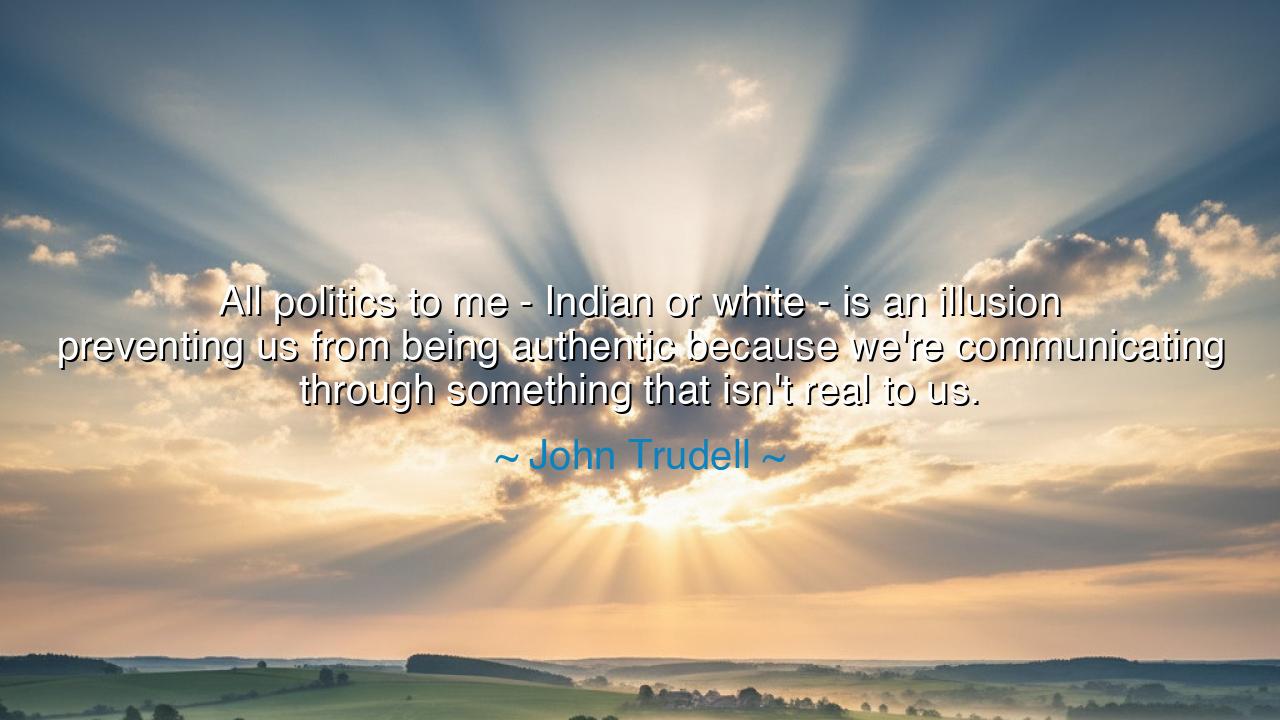
All politics to me - Indian or white - is an illusion preventing
All politics to me - Indian or white - is an illusion preventing us from being authentic because we're communicating through something that isn't real to us.






The words of John Trudell, warrior-poet of the modern age, strike like a thunderbolt against the false towers of politics. He tells us that these systems, whether of the Indian or the white, are but illusions, shadows on the wall of a cave, deceiving us into thinking we are speaking truth when in fact we are only echoing what power has shaped. To Trudell, the heart cannot breathe within these hollow structures, for they are not born of our spirits but imposed upon them.
Authenticity, he declares, is found not in the language of institutions but in the real voices of human beings, in the fire of their songs, in the grief of their mothers, in the courage of their children. Politics makes us translate ourselves into symbols and negotiations that do not belong to our souls. Thus, when we speak through politics, we no longer speak as who we are—we speak as puppets, moved by invisible strings.
This truth was carved in history upon the fate of Trudell’s own people. The treaties signed between Native nations and the United States were written in the language of politics—yet they were not real to those who signed them in good faith. Promises made on paper dissolved into broken land, poisoned rivers, and grief-laden silence. The people had spoken from authenticity, trusting in sacred bonds; the government had spoken from illusion, cloaked in politics, and so the voices never met.
Consider too the fate of the Lakota at Wounded Knee in 1890. Their dances, their prayers, their Ghost Dance—these were authentic cries of survival, of identity, of spirit. Yet the politics of Washington labeled them as threats, illusions of danger that justified slaughter. Here the divide is clear: one side speaking from the root of being, the other from the shadow of illusion.
Thus Trudell’s teaching becomes timeless: beware the temptation to speak only through systems that are not born of you. Seek instead the language of the heart, of community, of earth and spirit. For only when we break free from the illusion of politics can we walk as authentic beings, untamed and unbroken, heirs of a truth that no empire can rewrite.






HNtran hong nhung
Trudell’s view that politics is an illusion preventing us from being authentic really resonates with me, especially when you consider how much of political discourse is based on ideologies and labels that don’t reflect people’s true experiences. Is it possible to break free from these constructs to create a more direct, authentic way of communicating? What would a world look like if we weren’t defined by politics, but by shared human experiences instead?
TANguyen Thanh An
John Trudell seems to be questioning the very foundation of our political systems, suggesting that they’re not only artificial but also a barrier to true authenticity. If all politics are illusions, does that mean that people are merely playing roles in a system that doesn’t reflect reality? Can we ever truly express ourselves authentically while operating within these frameworks, or does this illusion prevent us from ever being truly free?
CTNguyen Ngoc Chi Thanh
I find Trudell’s statement thought-provoking, especially the idea that both Indian and white politics are ultimately illusions. It’s as though politics, regardless of culture or race, prevents us from being who we truly are. Could this be a comment on the way politics often reduces complex issues to categories and labels? If we could strip away these artificial structures, would we be able to connect with each other on a more authentic level?
HHHoang Ha
John Trudell’s perspective on politics being an illusion really challenges the way we view political systems. If politics is just a tool that distorts our authentic selves, can we truly engage in meaningful dialogue through it? Is the political system itself built on constructs that separate us from who we truly are? I wonder, though, if there’s a way to make politics more genuine or if it’s inherently flawed from the start.